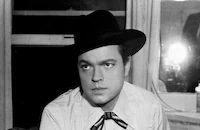It's All True: Based on an Unfinished Film by Orson Welles
Brief Synopsis
Cast & Crew
Bill Krohn
Orson Welles
Miguel Ferrer
Dean Beville
Elizabeth Wilson
Shifra Haran
Film Details
Technical Specs
Synopsis
Only the final segment of "It's All True," Orson Welles' legendary uncompleted film, survived--in the form of unedited rushes--in its entirety. That segment, called "Four Men on a Raft," has been reconstructed for this documentary chronicling the adventures of Hollywood's greatest enfant terrible in the tropics. Also included is footage from the remaining segments, "My Friend Bonito" and "Carnaval."
Cast

Orson Welles
Miguel Ferrer
Dean Beville

Elizabeth Wilson
Shifra Haran
Joseph Biroc
Richard Wilson
Crew
Jorge Arriagada
Catherine Benamou
Dean Beville
Amaury Candido Bezerra
Jose Verissimo Deoliviera
Jean-pierre Duret
George Fanto
Robert Flaherty
Gary Graver
Regine Konickier
Bill Krohn
Bill Krohn
Ed Marx
Myron Meisel
Myron Meisel
David Neves
Jean-luc Ormieres
Rogerio Sganzerla
Elizabeth Wilson
Richard Wilson
Richard Wilson
Richard Wilson
Film Details
Technical Specs
Quotes
Trivia
Miscellaneous Notes
Named best documentary by the Los Angeles Film Critics Association (1993).
Released in United States Fall October 17, 1993
Released in United States on Video August 10, 1994
Released in United States 1993
Released in United States October 1993
Released in United States February 1994
Released in United States April 1994
Shown at VII Americas Film Fsetival (AFI) In Santa Monica, CA October 29 - November 4, 1993.
Shown at New York Film Festival October 1-17, 1993.
Shown at VII Americas Film Festival (AFI) in Washington, DC October 21-31, 1993.
Shown at Berlin International Film Festival (International Forum of Young Cinema) February 10-21, 1994.
Shown at USA Film Festival in Dallas April 21-28, 1994.
Welles, still involved with production on "The Magnificent Ambersons" (USA/1942), reluctantly agreed. "It's All True" was intended as an anthology, including a Mexican segment called "My Friend Bonito," based on a story by documentarian Robert Flaherty, and a Technicolor samba musical which Welles began shooting on sound stages in Rio de Janeiro before being fired by RKO. After his dismissal, Welles remained in South America to shoot a third segment, "Four Men on a Raft," a brief epic about the fishermen of northeastern Brazil.
Additional credits for Welles' "Four Men on a Raft" include: George Fanto as director of photography and Richard Wilson as associate producer.
Received a special citation from the National Society of Film Critics (1993).
Original footage began shooting during 1942.
After the Japanese attack on Pearl Harbor in late 1941, Nelson Rockefeller, working for the State Department, recruited Welles as a special ambassador to South America to make a film designed to promote President Franklin D. Roosevelt's Good Neighbor Policy. (Rockefeller, not so incidentally, was also a large stockholder in RKO Pictures.)
Released in United States Fall October 17, 1993
Released in United States on Video August 10, 1994
Released in United States 1993 (Shown at AFI/Los Angeles International Film Festival (Salute to Film Preservation) June 10 ¿ July 1, 1993.)
Released in United States 1993 (Shown at VII Americas Film Fsetival (AFI) In Santa Monica, CA October 29 - November 4, 1993.)
Released in United States October 1993 (Shown at New York Film Festival October 1-17, 1993.)
Released in United States October 1993 (Shown at VII Americas Film Festival (AFI) in Washington, DC October 21-31, 1993.)
Released in United States February 1994 (Shown at Berlin International Film Festival (International Forum of Young Cinema) February 10-21, 1994.)
Released in United States April 1994 (Shown at USA Film Festival in Dallas April 21-28, 1994.)











